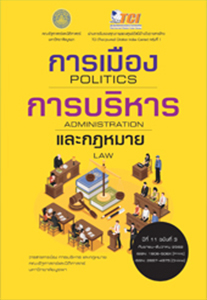ปัจจัยที่มีอิทธิพลต่อความผูกพันต่อองค์การของพนักงานมหาวิทยาลัย สายวิชาการ ในสถาบันอุดมศึกษา มหาวิทยาลัยราชภัฏนครสวรรค์
คำสำคัญ:
ความผูกพันต่อองค์กร, พนักงานมหาวิทยาลัย, มหาวิทยาลัยราชภัฎนครสวรรค์บทคัดย่อ
การวิจัยนี้มีวัตถุประสงค์ 3 ประการคือ 1) เพื่อศึกษาระดับปัจจัยความผูกพันต่อองค์การของพนักงานมหาวิทยาลัยสายวิชาการ มหาวิทยาลัยราชภัฏนครสวรรค์ 2) วิเคราะห์ความสัมพันธ์เชิงเหตุผล (ตามรูปแบบสมการโครงสร้าง) ความผูกพันต่อองค์การของพนักงานมหาวิทยาลัย สายวิชาการ และ 3) เพื่อนำเสนอแนวทางที่เหมาะสมสำหรับการพัฒนาความผูกพันต่อองค์การของพนักงานมหาวิทยาลัยสายวิชาการ ข้อมูลที่ใช้ในการศึกษาได้มาจากแบบสอบถาม [(IOC)=0.948 และ Alpha-reliability =0.984] ของพนักงานมหาวิทยาลัย 201 คน (100% ของกลุ่มตัวอย่าง) สถิติที่ใช้ในการวิเคราะห์ข้อมูล ได้แก่ จำนวน ร้อยละ ค่าเฉลี่ย ส่วนเบี่ยงเบนมาตรฐาน One-sample t-test และ การวิเคราะห์เส้นทาง (Path Analysis) โดยใช้โปรแกรม LISREL Version 8.72 แบบ Basic Model ผลการวิจัยสรุปได้ดังนี้ 1) ความผูกพันต่อองค์การของพนักงานมหาวิทยาลัย ในภาพรวมทั้งหมดอยู่ในระดับต่ำ โดยมีค่าเฉลี่ย 3.86 อย่างมีนัยสำคัญที่ระดับ .05 และ เมื่อพิจารณารายด้านทั้ง 5 ด้าน คือ ภาวะผู้นำการเปลี่ยนแปลง บรรยากาศขององค์การ ความพึงพอใจต่อการทำงาน คุณภาพชีวิตในการทำงาน และความผูกพันต่อองค์การ มี 4 ใน 5 ด้านอยู่ในระดับต่ำ 2) ผลการวิเคราะห์ความสัมพันธ์เชิงเหตุผล (ตามแบบจำลองสมการโครงสร้าง) พบว่า แบบจำลองมีความสอดคล้องกับข้อมูลเชิงประจักษ์เป็นไปตามข้อตกลงคือ Chi-square = 343.07, df = 398, P-value = 0.97834, RMSEA = 0.000 สรุปได้ว่า ความผูกพันต่อองค์กรของพนักงานมหาวิทยาลัย ได้รับอิทธิพลทางตรงมาจากคุณภาพชีวิตการทำงาน ในระดับปานกลาง และความพึงพอใจในการทำงาน ในระดับต่ำ ขณะเดียวกันได้รับอิทธิพลทางอ้อมมาจากภาวะผู้นำการเปลี่ยนแปลง ในระดับต่ำ บรรยากาศขององค์กร ในระดับปานกลาง โดยส่งผ่านปัจจัยความพึงพอใจในการทำงาน และ/ หรือได้รับอิทธิพลทางอ้อมจากภาวะผู้นำการเปลี่ยนแปลง ในระดับต่ำ บรรยากาศขององค์กร ในระดับปานกลาง และความพึงพอใจในการทำงาน ในระดับต่ำ โดยส่งผ่านปัจจัยคุณภาพชีวิตการทำงานของพนักงาน และพบว่า ปัจจัยดังกล่าวสามารถทำนายความผูกพันต่อองค์กรของพนักงานได้ ร้อยละ 51.50 อย่างมีนัยสำคัญที่ระดับ .05 และ 3) แนวทางที่เหมาะสมต่อการพัฒนาความผูกพันต่อองค์การของพนักงานมหาวิทยาลัยอย่างเร่งด่วน มีอยู่ 27 ประเด็นสำคัญ (5 แนวทาง) คือ ปัจจัยด้านบรรยากาศองค์การ (1 แนวทาง) และปัจจัยด้านภาวะผู้นำการเปลี่ยนแปลง (4 แนวทาง)






